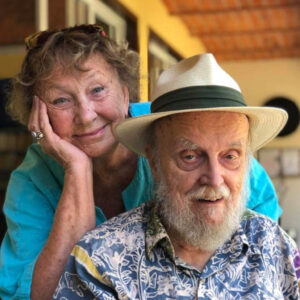Thinking Outside the Box: Courageous and Creative Choices in Care
A conversation with Phyllis Ray, by Mel Watson – Island Senior Resources
We don’t like to think about it, but most people will need long-term care in their lifetime. We’re encouraged to make plans for what happens when we need help, but we often don’t do it.
The path to diagnosis and care may be challenging and leave us feeling vulnerable, so denial feels safer. Yet, there are choices when considering long-term care, and moving out of the U.S. is one option for those who travel the family caregiver path. Phyllis told us her story.
“Robert started getting sick about 15 years ago. It was subtle. There were the little things he couldn’t do, and I thought that it was that he wouldn’t do them. I’d get mad at him. Not knowing that these were early stages of Lewy Body Dementia,” Phylis shared during a conversation we had. “We used to love to watch TV together, but then he quit watching movies. I realize now that he couldn’t follow the plot.”
Caregiving is not something everyone can relate to or identify with. A caregiver is a person who provides direct care to an individual with a physical or cognitive impairment. So, it is understandable that family members don’t identify as caregivers in the pre-diagnosis stage. They are busy questioning, doubting, feeling confused, being in denial, covering up, late-night “Googling” for answers, denying, feeling angry, and trying desperately to find anything that could explain the changes. Eventually, they are forced into navigating the health care system to find answers.
“I was extremely confused, trying to find out what was going on,” Phylis said. “We tried everything from psychologists, psychiatrists, medications, and even shock treatment. You get desperate, and with his disease, it comes and goes.” Robert could be fine one day and have symptoms the next. Like most family caregivers, Phylis had to plan and adjust constantly, asking herself, “Am I doing the right thing? Can I do better? What does he need? What kind of help can we get? Can I do this? I became less secure about leaving him home alone; friends would help, then I started hiring people…somewhere along the way, I became determined that Robert’s disease would not take us both out.”
At this point, they still didn’t have a diagnosis. Against professional advice, Phylis met with a neuropsychologist, who she describes as “the most helpful person of all the professional people that they saw in those years.” They finally diagnosed Robert with Lewy Body Dementia.
Robert’s symptoms progressed, and they made the difficult decision for Robert to move to what Phyllis thought “was the best local assisted living option.” Initially, she would stay over regularly, then just visit for some meals. “Every little step of the way, we had to adjust. He was becoming angry and difficult; I knew he wasn’t happy, and the costs of his care were nearing $10,000 a month. There was never a time when I could stop thinking about all this; I got depressed, and joy was leaving my life.”
Phyllis was prescribed an anti-depressant and then decided to visit some friends in Mexico, who encouraged her to bring Robert to Ajijic in Mexico for care. Hopeful, Phyllis spent days researching, visiting, and interviewing owners and residents from care homes in Ajijic while she was there and decided they would do it. Robert was moving to La Casa Nostra, and she would live nearby.
“I knew in my bones that this was my only choice. It’s radical, but knowing I had an option was a relief. I took a class on ‘Everything you need to know about moving to a foreign country,’ and it took two months to get things in order. Our best friends came with us to help with the transition, which had challenges, although the trip down was a piece of cake. Alaska Airlines was amazing. Robert’s social security covered his care costs, and my social security covered my costs.”
People in their new hometown were extremely kind, deeply respectful, generous, and naturally caregiving; she made lifelong and deep friendships. “Robert’s disease helped me get patience, and I slowed down. Moving to Ajijic let me be his wife and his friend. It was the best choice; it gave him safety and care, and it gave me freedom. Now, I am a kinder, more respectful, and more patient person.”
image: Phyllis Ray and Robert Carlson

